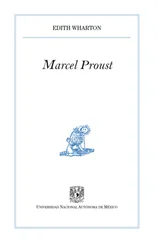The shock of this retort had the effect of crystallizing Selden’s wavering intentions.
“I am not so sure of your answer,” he said quietly. “And I do you the justice to believe that you are not either.”
It was her turn to look at him with surprise; and after a moment—“Do you want to marry me?” she asked.
He broke into a laugh. “No, I don’t want to—but perhaps I should if you did!”
“That’s what I told you—you’re so sure of me that you can amuse yourself with experiments.” She drew back the hand he had regained, and sat looking down on him sadly.
“I am not making experiments,” he returned. “Or if I am, it is not on you but on myself. I don’t know what effect they are going to have on me—but if marrying you is one of them, I will take the risk.”
She smiled faintly. “It would be a great risk, certainly—I have never concealed from you how great.”
“Ah, it’s you who are the coward!” he exclaimed.
She had risen, and he stood facing her with his eyes on hers. The soft isolation of the falling day enveloped them: they seemed lifted into a finer air. All the exquisite influences of the hour trembled in their veins, and drew them to each other as the loosened leaves were drawn to the earth.
“It’s you who are the coward,” he repeated, catching her hands in his.
She leaned on him for a moment, as if with a drop of tired wings: he felt as though her heart were beating rather with the stress of a long flight than the thrill of new distances. Then, drawing back with a little smile of warning—“I shall look hideous in dowdy clothes; but I can trim my own hats,” she declared.
They stood silent for a while after this, smiling at each other like adventurous children who have climbed to a forbidden height from which they discover a new world. The actual world at their feet was veiling itself in dimness, and across the valley a clear moon rose in the denser blue.
Suddenly they heard a remote sound, like the hum of a giant insect, and following the high-road, which wound whiter through the surrounding twilight, a black object rushed across their vision.
Lily started from her attitude of absorption; her smile faded and she began to move toward the lane.
“I had no idea it was so late! We shall not be back till after dark,” she said, almost impatiently.
Selden was looking at her with surprise: it took him a moment to regain his usual view of her; then he said, with an uncontrollable note of dryness: “That was not one of our party; the motor was going the other way.”
“I know—I know—” She paused, and he saw her redden through the twilight. “But I told them I was not well—that I should not go out. Let us go down!” she murmured.
Selden continued to look at her; then he drew his cigarette-case from his pocket and slowly lit a cigarette. It seemed to him necessary, at that moment, to proclaim, by some habitual gesture of this sort, his recovered hold on the actual: he had an almost puerile wish to let his companion see that, their flight over, he had landed on his feet.
She waited while the spark flickered under his curved palm; then he held out the cigarettes to her.
She took one with an unsteady hand, and putting it to her lips, leaned forward to draw her light from his. In the indistinctness the little red gleam lit up the lower part of her face, and he saw her mouth tremble into a smile.
“Were you serious?” she asked, with an odd thrill of gaiety which she might have caught up, in haste, from a heap of stock inflections, without having time to select the just note. Selden’s voice was under better control. “Why not?” he returned. “You see I took no risks in being so.” And as she continued to stand before him, a little pale under the retort, he added quickly: “Let us go down.”
It spoke much for the depth of Mrs. Trenor’s friendship that her voice, in admonishing Miss Bart, took the same note of personal despair as if she had been lamenting the collapse of a house-party.
“All I can say is, Lily, that I can’t make you out!” She leaned back, sighing, in the morning abandon of lace and muslin, turning an indifferent shoulder to the heaped-up importunities of her desk, while she considered, with the eye of a physician who has given up the case, the erect exterior of the patient confronting her.
“If you hadn’t told me you were going in for him seriously—but I’m sure you made that plain enough from the beginning! Why else did you ask me to let you off bridge, and to keep away Carry and Kate Corby? I don’t suppose you did it because he amused you; we could none of us imagine your putting up with him for a moment unless you meant to marry him. And I’m sure everybody played fair! They all wanted to help it along. Even Bertha kept her hands off—I will say that—till Lawrence came down and you dragged him away from her. After that she had a right to retaliate—why on earth did you interfere with her? You’ve known Lawrence Selden for years—why did you behave as if you had just discovered him? If you had a grudge against Bertha it was a stupid time to show it—you could have paid her back just as well after you were married! I told you Bertha was dangerous. She was in an odious mood when she came here, but Lawrence’s turning up put her in a good humour, and if you’d only let her think he came for her it would have never occurred to her to play you this trick. Oh, Lily, you’ll never do anything if you’re not serious!”
Miss Bart accepted this exhortation in a spirit of the purest impartiality. Why should she have been angry? It was the voice of her own conscience which spoke to her through Mrs. Trenor’s reproachful accents. But even to her own conscience she must trump up a semblance of defence. “I only took a day off—I thought he meant to stay on all this week, and I knew Mr. Selden was leaving this morning.”
Mrs. Trenor brushed aside the plea with a gesture which laid bare its weakness.
“He did mean to stay—that’s the worst of it. It shows that he’s run away from you; that Bertha’s done her work and poisoned him thoroughly.”
Lily gave a slight laugh. “Oh, if he’s running I’ll overtake him!”
Her friend threw out an arresting hand. “Whatever you do, Lily, do nothing!”
Miss Bart received the warning with a smile. “I don’t mean, literally, to take the next train. There are ways—” But she did not go on to specify them.
Mrs. Trenor sharply corrected the tense. “There were ways—plenty of them! I didn’t suppose you needed to have them pointed out. But don’t deceive yourself—he’s thoroughly frightened. He has run straight home to his mother, and she’ll protect him!”
“Oh, to the death,” Lily agreed, dimpling at the vision.
“How you can laugh —” her friend rebuked her; and she dropped back to a soberer perception of things with the question: “What was it Bertha really told him?”
“Don’t ask me—horrors! She seemed to have raked up everything. Oh, you know what I mean—of course there isn’t anything, really ; but I suppose she brought in Prince Varigliano—and Lord Hubert—and there was some story of your having borrowed money of old Ned Van Alstyne: did you ever?”
“He is my father’s cousin,” Miss Bart interposed.
“Well, of course she left that out. It seems Ned told Carry Fisher; and she told Bertha, naturally. They’re all alike, you know: they hold their tongues for years, and you think you’re safe, but when their opportunity comes they remember everything.”
Lily had grown pale: her voice had a harsh note in it. “It was some money I lost at bridge at the Van Osburghs’. I repaid it, of course.”
Читать дальше












